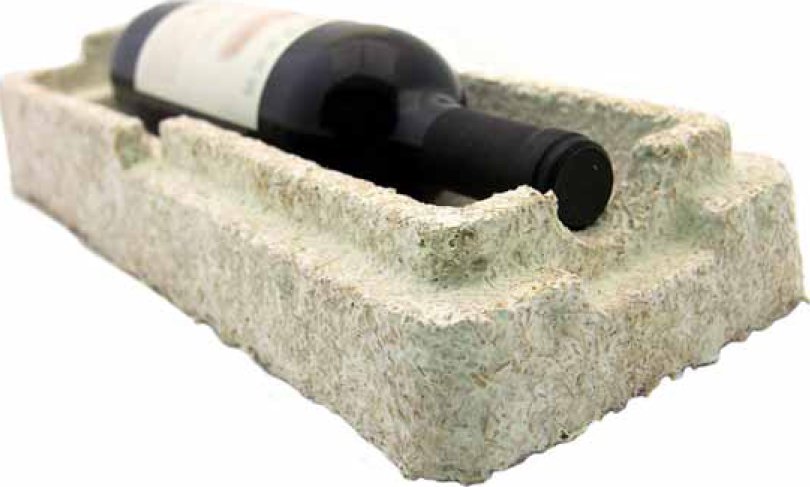Fast growing, low water consumption, compostable and a material that does not take anything out of the planet that can’t be put back; this sounds like a miracle material that could potentially make plastic packing foams redundant. Evocative is a company formed by a group of designers who have found potential in mycelium, a fungal network of threadlike cells that is formed in the roots of a mushroom, to replace conventional plastic foams.
As with bacterial cellulose, one step in the chain of production of this material is removed because it is grown and formed directly into the shape in which it is needed. The product, called EcoCradle®, is grown in the dark at the very fast rate of between five and seven days, with no need for water or petrochemical inputs. Once grown, the material has properties similar to expanded plastic foam, also with a similar cost. The material is acoustic, thermal and shock insulating, as well as being Class 1 fire retardant. This innovation has resulted in a completely new type of foam product. It was invented on the premise that traditional packing foams are made from oil/plastics that take more than 65 million years to form and are mainly used in a product that has a very short lifespan.
EcoCradle® is soft and about as strong as low-density expanded polystyrene foams, but not as durable; however, when it is combined with other materials this is not the case.
Image: EcoCradle® packaging

Key features
•Lightweight
•Naturally fire retardant
•Cushioning
•Low cost
•Good insulation properties
•Shock absorbent
•Low water consumption
•Rapidly renewable
•Compelling consumer story
•Biodegradable
•Carbon neutral
Cost
The cost of EcoCradle® is comparable to, or even cheaper than, expanded polystyrene foams. These include insulation blocks and acoustics tiles for buildings, as well as candles and herb planters, and many traditional plastic foam applications in cars.
Sustainability issues
EcoCradle® has sustainability at its heart and is the direct result of looking at ways to reduce waste and reduce the use of plastics. It is fully biodegradable but it takes soil biota and long-term exposure to water to trigger natural biodegradation. EcoCradle® provides an excellent alternative to traditional packaging materials or applications where a lightweight composite is required. EcoCradle® can be used to make disposable products of considerable size
Production
Because it is grown rather than manufactured, there are limited options available for processing this material; however, almost any shape can be ‘grown’ into a mould in about a week. Due to Ecovative’s unusual production technique, this material may be best suited to bold shapes. The thinnest walls that can currently be produced are approximately 13 mm (½ in), although they are currently working on creating a material that is much thinner.
Typical applications
The Ecovative website suggests a range of applications that range well beyond packaging.
| + | – |
|
–Inexpensive –Good shock absorbency and insulation –Excellent alternative to plastic packaging –100% sustainable |
–Limited manufacturing options –Limited availability |
